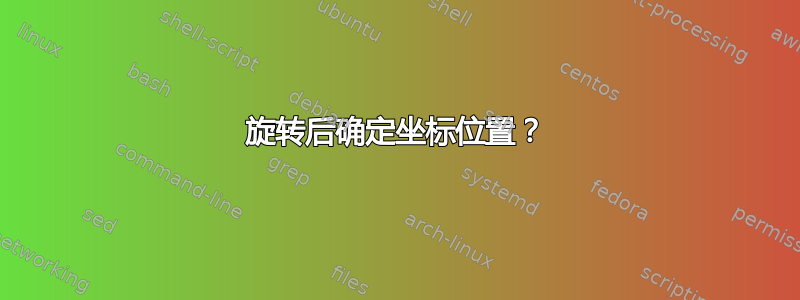
我设法将一些定义为图片的立方体定位在一个平面上,现在我想确定每个盒子中下框的位置,以便可以绘制从原点到此位置的矢量。但该命令rotate around z=...似乎改变了已知的矢量终点位置(=盒子中的下框)。
如果盒子没有旋转并且没有添加任何内容(盒子内的框架偏移),则位置是正确的(除了盒子内框架的偏移),但我如何设法跟随这个位置,即使在旋转之后也添加框架偏移(M在我的盒子图中表示)。
笔记:即使是黄色框箭头也只指向框而不是里面的下框。因此在所有情况下都需要向量加法。(至少我是这么认为的。但无论出于什么原因,这也没有指向正确的位置。)
目标:不要指向盒子角落,而是指向框架内部,即使旋转之后也是如此。



\documentclass[tikz,border=1cm]{standalone}
\usetikzlibrary{backgrounds,perspective,calc}
\begin{document}
\begin{tikzpicture}[>=latex,line cap=round,line join=round,scale=2]
\newcommand{\simpleaxes}[6]{% 1-3 position, 4-6 size
\draw[->] (-0.5+#1,#2,#3) -- (#1+#4,#2,#3) node[pos=1.1]{x};
\draw[->] (#1,-0.5+#2,#3) -- (#1,#2+#5,#3) node[pos=1.1]{y};
\draw[->] (#1,#2,-0.5+#3) -- (#1,#2,#3+#6) node[pos=1.1]{z};}
\tikzset{pics/coordsys/.style={
code = {\tikzset{coordsys/.cd,#1}
\draw [->,pic actions] (0,0,0) -- (1,0,0)[red] node[pos=1.4]
{$\pgfkeysvalueof{/tikz/coordsys/x}$};
\draw [->,pic actions] (0,0,0) -- (0,1,0)[green!60!black] node[pos=1.2]
{$\pgfkeysvalueof{/tikz/coordsys/y}$};
\draw [->,pic actions] (0,0,0) -- (0,0,1)[blue] node[pos=1.2]
{$\pgfkeysvalueof{/tikz/coordsys/z}$};
}
},coordsys/.cd,x/.initial=x,y/.initial=y,z/.initial=z}
\tikzset{pics/coordsysshift/.style={
code = {\tikzset{coordsysshift/.cd,#1}
\begin{scope}[rotate around z=45, rotate around y=45, rotate around x=45]
\draw [->,pic actions] (0,0,0) -- (1,0,0)[red] node[pos=1.3]
{$\pgfkeysvalueof{/tikz/coordsysshift/x}$};
\draw [->,pic actions] (0,0,0) -- (0,1,0)[green!60!black] node[pos=1.2]
{$\pgfkeysvalueof{/tikz/coordsysshift/y}$};
\draw [->,pic actions] (0,0,0) -- (0,0,1)[blue] node[pos=1.2]
{$\pgfkeysvalueof{/tikz/coordsysshift/z}$};
\end{scope}
}
},coordsysshift/.cd,x/.initial=x,y/.initial=y,z/.initial=z}
\tikzset{
pics/complicated/.style={
code={
\tikzset{complicated/.cd,#1}
\begin{scope}[transparency group, fill opacity=0.8]
\draw[\boxframecolor,fill=\boxfillcolor] (0,0,\cubez) %xy plane/top face
-- ++(\cubex,0,0)
-- ++(0,\cubey,0)
-- ++(-\cubex,0,0) -- cycle;
\draw[\boxframecolor,fill=\boxfillcolor] (0,0,0) %yz plane/left face
-- ++(0,0,\cubez)
-- ++(0,\cubey,0)
-- ++(0,0,-\cubez) -- cycle;
\draw[\boxframecolor,fill=\boxfillcolor] (0,0,0) %xz plane/front face
-- ++(\cubex,0,0)
-- ++(0,0,\cubez)
-- ++(-\cubex,0,0) -- cycle;
%%%% define positioning of M,B frames inside box
\pgfmathsetmacro{\dx}{0.5};
\pgfmathsetmacro{\dy}{0.5};
\pgfmathsetmacro{\dz}{0.4};
\coordinate (origin) at (-5,0,0);
%\coordinate (M) at (\dx,\cubey-\dy,\dz);
%\coordinate (B) at (\cubex-\dx,\dy,\cubez-\dz);
\coordinate (M) at (\dx,\dy,\dz);
\coordinate (B) at (\cubex-\dx,\cubey-\dy,\cubez-\dz);
\draw (M) pic[thick] {coordsys={x=x_M,y=y_M,z=z_M}};
\node [below right] at (M.south) {\textit{M}};
\draw (B) pic[dotted] {coordsys={x=x_M',y=y_M',z=z_M'}};
\node [above left] at (B.west) {\textit{B}};
\draw (B) pic[thick] {coordsysshift={x=x_{B},y=y_{B},z=z_{B}}};
\draw [->, thick] (M) -- (B) node [midway,fill=\boxfillcolor] {$q_{MB}, r_{MB}$};
\end{scope}
}
},
complicated/.cd,
cube x/.store in=\cubex,
cube x=8,
cube y/.store in=\cubey,
cube y=8,
cube z/.store in=\cubez,
cube z=2,
box fill color/.store in=\boxfillcolor,
box fill color=yellow!25,
box frame color/.store in=\boxframecolor,
box frame color=gray!25
}
\begin{scope}[3d view={-80}{15}]
\simpleaxes{0}{0}{0}{8}{8}{2};
\coordinate (posyellow) at (0,5,0);
\coordinate (posblue) at (2,4,0);
\path (0,5,0) pic(yellow) {complicated={box frame color=yellow}};
% in line below: [rotate around z=-50] is the problem, how to follow rot. ?
\path [rotate around z=-50](2,4,0) pic (blue) {complicated={box fill color=blue!25,box frame color=blue}};
\path (0,0,-5) pic {coordsys};
\draw [->,dotted, opacity=0.8] (0,0,-5) -- ($(posyellow)$); % +yellowM
\draw [->,dotted, opacity=0.8] (0,0,-5) -- ($(posblue)$);%,rotate around z=-50 % ($(posblue)+(blueM)$)
\end{scope}
\end{tikzpicture}
\end{document}
答案1
您只需(origin)在 的原点添加一个命名坐标即可pic。鉴于pic具有名称yellow和,该坐标可以从外部blue称为yelloworigin和。blueorigin
\documentclass[tikz,border=1cm]{standalone}
\usetikzlibrary{backgrounds,perspective,calc}
\begin{document}
\begin{tikzpicture}[>=latex,line cap=round,line join=round,scale=2]
\newcommand{\simpleaxes}[6]{% 1-3 position, 4-6 size
\draw[->] (-0.5+#1,#2,#3) -- (#1+#4,#2,#3) node[pos=1.1]{x};
\draw[->] (#1,-0.5+#2,#3) -- (#1,#2+#5,#3) node[pos=1.1]{y};
\draw[->] (#1,#2,-0.5+#3) -- (#1,#2,#3+#6) node[pos=1.1]{z};}
\tikzset{pics/coordsys/.style={
code = {\tikzset{coordsys/.cd,#1}
\draw [->,pic actions] (0,0,0) -- (1,0,0)[red] node[pos=1.4]
{$\pgfkeysvalueof{/tikz/coordsys/x}$};
\draw [->,pic actions] (0,0,0) -- (0,1,0)[green!60!black] node[pos=1.2]
{$\pgfkeysvalueof{/tikz/coordsys/y}$};
\draw [->,pic actions] (0,0,0) -- (0,0,1)[blue] node[pos=1.2]
{$\pgfkeysvalueof{/tikz/coordsys/z}$};
}
},coordsys/.cd,x/.initial=x,y/.initial=y,z/.initial=z}
\tikzset{pics/coordsysshift/.style={
code = {\tikzset{coordsysshift/.cd,#1}
\begin{scope}[rotate around z=45, rotate around y=45, rotate around x=45]
\draw [->,pic actions] (0,0,0) -- (1,0,0)[red] node[pos=1.3]
{$\pgfkeysvalueof{/tikz/coordsysshift/x}$};
\draw [->,pic actions] (0,0,0) -- (0,1,0)[green!60!black] node[pos=1.2]
{$\pgfkeysvalueof{/tikz/coordsysshift/y}$};
\draw [->,pic actions] (0,0,0) -- (0,0,1)[blue] node[pos=1.2]
{$\pgfkeysvalueof{/tikz/coordsysshift/z}$};
\end{scope}
}
},coordsysshift/.cd,x/.initial=x,y/.initial=y,z/.initial=z}
\tikzset{
pics/complicated/.style={
code={
\tikzset{complicated/.cd,#1}
\begin{scope}[transparency group, fill opacity=0.8]
\draw[\boxframecolor,fill=\boxfillcolor] (0,0,\cubez) %xy plane/top face
-- ++(\cubex,0,0)
-- ++(0,\cubey,0)
-- ++(-\cubex,0,0) -- cycle;
\draw[\boxframecolor,fill=\boxfillcolor] (0,0,0) %yz plane/left face
-- ++(0,0,\cubez)
-- ++(0,\cubey,0)
-- ++(0,0,-\cubez) -- cycle;
\draw[\boxframecolor,fill=\boxfillcolor] (0,0,0) %xz plane/front face
-- ++(\cubex,0,0)
-- ++(0,0,\cubez)
-- ++(-\cubex,0,0) -- cycle;
%%%% define positioning of M,B frames inside box
\pgfmathsetmacro{\dx}{0.5};
\pgfmathsetmacro{\dy}{0.5};
\pgfmathsetmacro{\dz}{0.4};
\coordinate (origin) at (-5,0,0);
%\coordinate (M) at (\dx,\cubey-\dy,\dz);
%\coordinate (B) at (\cubex-\dx,\dy,\cubez-\dz);
\coordinate (M) at (\dx,\dy,\dz);
\coordinate (B) at (\cubex-\dx,\cubey-\dy,\cubez-\dz);
\path (0,0,0) coordinate (origin);
\draw (M) pic[thick] {coordsys={x=x_M,y=y_M,z=z_M}};
\node [below right] at (M.south) {\textit{M}};
\draw (B) pic[dotted] {coordsys={x=x_M',y=y_M',z=z_M'}};
\node [above left] at (B.west) {\textit{B}};
\draw (B) pic[thick] {coordsysshift={x=x_{B},y=y_{B},z=z_{B}}};
\draw [->, thick] (M) -- (B) node [midway,fill=\boxfillcolor] {$q_{MB}, r_{MB}$};
\end{scope}
}
},
complicated/.cd,
cube x/.store in=\cubex,
cube x=8,
cube y/.store in=\cubey,
cube y=8,
cube z/.store in=\cubez,
cube z=2,
box fill color/.store in=\boxfillcolor,
box fill color=yellow!25,
box frame color/.store in=\boxframecolor,
box frame color=gray!25
}
\begin{scope}[3d view={-80}{15}]
\simpleaxes{0}{0}{0}{8}{8}{2};
\coordinate (posyellow) at (0,5,0);
\coordinate (posblue) at (2,4,0);
\path (0,5,0) pic(yellow) {complicated={box frame color=yellow}};
% in line below: [rotate around z=-50] is the problem, how to follow rot. ?
\path [rotate around z=-50](2,4,0) pic (blue) {complicated={box fill color=blue!25,box frame color=blue}};
\path (0,0,-5) pic {coordsys};
\draw [->,dotted, opacity=0.8] (0,0,-5) -- (yelloworigin); % +yellowM
\draw [->,dotted, opacity=0.8] (0,0,-5) -- (blueorigin);%,rotate around z=-50 % ($(posblue)+(blueM)$)
\end{scope}
\end{tikzpicture}
\end{document}



